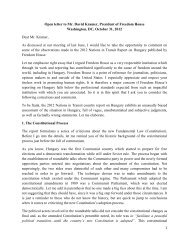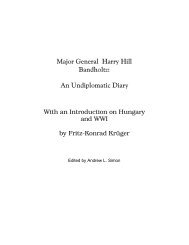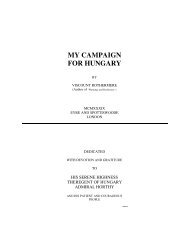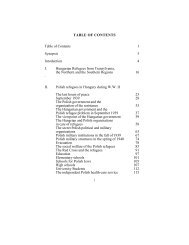The Fate of Western Hungary 1918-1921 - Corvinus Library ...
The Fate of Western Hungary 1918-1921 - Corvinus Library ...
The Fate of Western Hungary 1918-1921 - Corvinus Library ...
Create successful ePaper yourself
Turn your PDF publications into a flip-book with our unique Google optimized e-Paper software.
<strong>of</strong> President Woodrow Wilson’s 14 Points, made public by the U.S. president<br />
on January 8, <strong>1918</strong>. Burián’s suggestion was rejected in a response note, in the<br />
name <strong>of</strong> the Entente Powers, by British Foreign Secretary Arthur Balfour on<br />
September 16 th , by French Prime Minister Clemenceau on the 17 th , and by US<br />
Secretary <strong>of</strong> State Robert Lansing on the 19 th .<br />
Ten days later, on the 29 th , as a result <strong>of</strong> the Entente forces’ Balkan<br />
<strong>of</strong>fensive, Bulgaria sued for a cease fire. As a result, Germany and the<br />
Monarchy were forced to face up to defeat. On the same day, the German<br />
Imperial War Council decided to sue for truce and, taking into consideration the<br />
Wilsonian 14 Points, to open peace talks. On October 4, at the same time as<br />
Germany and Turkey, Foreign Minister Burián sent another note to Woodrow<br />
Wilson on behalf <strong>of</strong> the Monarchy, proposing a truce and, based on Wilson’s<br />
14 Points, the beginning <strong>of</strong> peace negotiations. 12 Wilson rejected the notes sent<br />
by the Central Powers on October 8. Austrian Emperor and Hungarian King,<br />
Charles, proclaimed the transformation <strong>of</strong> Austria into a federative state on<br />
October 16 and directed the provinces to form their own National Councils.<br />
This, however, did not extend to the countries under the Hungarian Holy Crown<br />
(historical <strong>Hungary</strong>, including Transylvania, and the associated countries <strong>of</strong><br />
Croatia-Slavonia and the semi-autonomous territory <strong>of</strong> Fiume/Rijeka). Also, the<br />
common ministries <strong>of</strong> foreign affairs, finance and war remained. Two days<br />
later, on October 18, President Wilson wrote a reply to Foreign Minister<br />
Burián’s second note in which he stated that the 14 Points did not form the<br />
basis <strong>of</strong> talks with the Monarchy, having been born <strong>of</strong> different military and<br />
political circumstances. 13 <strong>The</strong> answer to the American note came on October 27<br />
from Count Gyula Andrássy (1860-1929), the new – and last – Foreign<br />
Minister <strong>of</strong> the Monarchy – Burián having been, in the interim, replaced – in<br />
which he accepted the Wilsonian settlement principles and the right <strong>of</strong> selfdetermination<br />
<strong>of</strong> the Czech-Slovak and South Slav peoples. During these<br />
weeks, the newspapers were full <strong>of</strong> the rabble-rousing and inflammatory<br />
speeches <strong>of</strong> parliamentary representatives Mihály Károlyi, László Fényes 14<br />
(1871-1944) and their ilk. Moreover, “the Italians threw thousands <strong>of</strong> leaflets<br />
(into our trenches) containing the subversive parliamentary speeches <strong>of</strong> Count<br />
Mihály Károlyi and friends, informing us before the arrival <strong>of</strong> the newspapers<br />
to the front,” 15 wrote Colonel Ferenc Nyékhegyi, commander <strong>of</strong> the 9 th Infantry<br />
12 Révai Mór, János: Magyarország integritása és a wilsoni elvek [<strong>Hungary</strong>’s territorial<br />
integrity and the Wilsonian principles]. Magyarország Területi Épségének Védelmi<br />
Ligája. Budapest, 1920, pp. 14–42.<br />
13 For the documents <strong>of</strong> the texts <strong>of</strong> exchange <strong>of</strong> the so-called Burián notes, see addenda<br />
in Rubint, Dezső: Az összeomlás [<strong>The</strong> collapse]. Budapest, 1922.<br />
14 In <strong>1918</strong>, László Fényes was Minister <strong>of</strong> State for War in the Károlyi government and<br />
commissar for Defence, organizing the disarmament <strong>of</strong> Hungarian and Szekler troops in<br />
Transylvania, which were self-organizing against a Romanian occupation.<br />
15 Nyékhegyi, Ferenc: A Diaz-féle fegyverszüneti szerződés. (A páduai fegyverszünet)<br />
[<strong>The</strong> Diaz ceasefire agreement. (<strong>The</strong> Padua ceasefire)]. Budapest, 1922, p. 54. Colonel<br />
Ferenc Nyékhegyi describes it based on personal experiences and bona fide documents.<br />
11
















